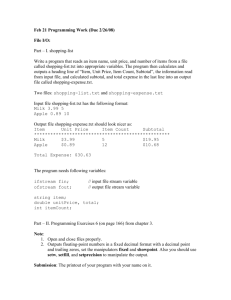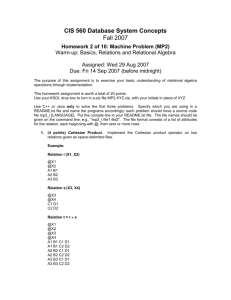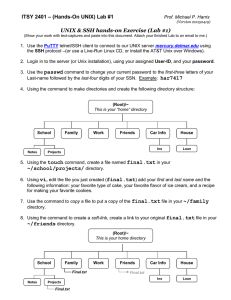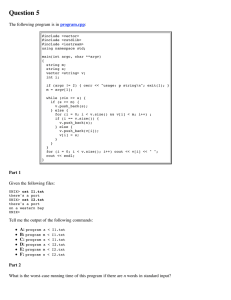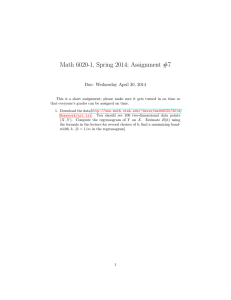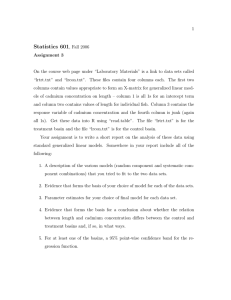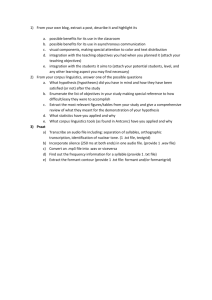CS360 Midterm Exam – February 25, 2010 – James S....
advertisement
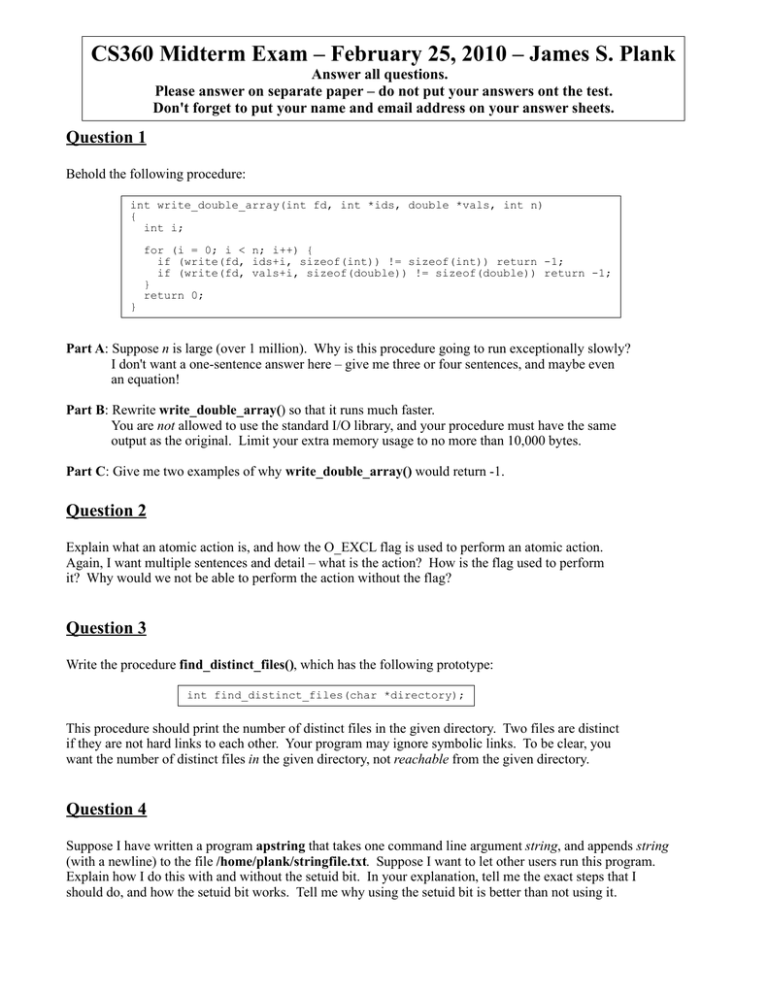
CS360 Midterm Exam – February 25, 2010 – James S. Plank
Answer all questions.
Please answer on separate paper – do not put your answers ont the test.
Don't forget to put your name and email address on your answer sheets.
Question 1
Behold the following procedure:
int write_double_array(int fd, int *ids, double *vals, int n)
{
int i;
for (i = 0; i < n; i++) {
if (write(fd, ids+i, sizeof(int)) != sizeof(int)) return -1;
if (write(fd, vals+i, sizeof(double)) != sizeof(double)) return -1;
}
return 0;
}
Part A: Suppose n is large (over 1 million). Why is this procedure going to run exceptionally slowly?
I don't want a one-sentence answer here – give me three or four sentences, and maybe even
an equation!
Part B: Rewrite write_double_array() so that it runs much faster.
You are not allowed to use the standard I/O library, and your procedure must have the same
output as the original. Limit your extra memory usage to no more than 10,000 bytes.
Part C: Give me two examples of why write_double_array() would return -1.
Question 2
Explain what an atomic action is, and how the O_EXCL flag is used to perform an atomic action.
Again, I want multiple sentences and detail – what is the action? How is the flag used to perform
it? Why would we not be able to perform the action without the flag?
Question 3
Write the procedure find_distinct_files(), which has the following prototype:
int find_distinct_files(char *directory);
This procedure should print the number of distinct files in the given directory. Two files are distinct
if they are not hard links to each other. Your program may ignore symbolic links. To be clear, you
want the number of distinct files in the given directory, not reachable from the given directory.
Question 4
Suppose I have written a program apstring that takes one command line argument string, and appends string
(with a newline) to the file /home/plank/stringfile.txt. Suppose I want to let other users run this program.
Explain how I do this with and without the setuid bit. In your explanation, tell me the exact steps that I
should do, and how the setuid bit works. Tell me why using the setuid bit is better than not using it.
CS360 Midterm Exam, Page 2
Question 5
Below is a program in readfile.c. Given the sequence of commands to the right, specify what the output will be with every
readfile call. If you think that the output will depend on the
machine/compiler, say so, but give the output that you know will
happen.
#include
#include
#include
#include
<stdio.h>
<stdlib.h>
<string.h>
<fcntl.h>
main(int argc, char **argv)
{
char buffer[10];
int i, fd;
strcpy(buffer, "123456789");
fd = open(argv[1], O_RDONLY);
i = read(fd, buffer, 10);
printf("%d %d %s\n", fd, i, buffer);
exit(0);
UNIX> echo ABCD > f1.txt
UNIX> cat f1.txt
ABCD
UNIX> ln f1.txt f2.txt
UNIX> cp f2.txt f3.txt
UNIX> ln f3.txt f4.txt
UNIX> chmod 0 f4.txt
UNIX> echo ABCDEFGHIJKLMN >
UNIX> cat f5.txt
ABCDEFGHIJKLMN
UNIX> readfile f1.txt
what is
UNIX> readfile f2.txt
what is
UNIX> readfile f3.txt
what is
UNIX> readfile f4.txt
what is
UNIX> readfile f5.txt
what is
UNIX> readfile f6.txt
what is
UNIX> readfile < f1.txt
what is
f5.txt
the output?
the output?
the output?
the output?
the output?
the output?
the output?
}
Question 6
Behold the following program, in umask_fun.c:
#include
#include
#include
#include
<stdio.h>
<stdlib.h>
<string.h>
<fcntl.h>
main(int argc, char **argv)
{
int fd;
char *s = "Hi\n";
UNIX> ls -l f?.txt | awk '{ print $1, $5, $9 }'
-rw------- 5 f2.txt
-r-------- 5 f3.txt
-rw-r--r-- 5 f5.txt
-rw---x--x 5 f7.txt
-r-xr-xr-x 5 f8.txt
UNIX> sh -c 'umask_fun > /dev/null 2>&1'
UNIX> ls -l f?.txt | awk '{ print $1, $5, $9 }'
umask(022);
fd = open("f1.txt", O_WRONLY | O_CREAT | O_TRUNC, 0666);
write(fd, s, 3); close(fd);
fd = open("f2.txt", O_WRONLY | O_CREAT | O_TRUNC, 0777);
write(fd, s, 3); close(fd);
fd = open("f3.txt", O_WRONLY | O_CREAT | O_TRUNC, 0777);
write(fd, s, 3); close(fd);
umask(276);
fd = open("f4.txt", O_WRONLY | O_CREAT, 0666);
write(fd, s, 3); close(fd);
fd = open("f5.txt", O_WRONLY | O_CREAT, 0777);
write(fd, s, 3); close(fd);
fd = open("f6.txt", O_WRONLY | O_CREAT, 0777);
write(fd, s, 3); close(fd);
umask(444);
fd = open("f7.txt", O_WRONLY, 0666);
write(fd, s, 3); close(fd);
fd = open("f8.txt", O_WRONLY, 0777);
write(fd, s, 3); close(fd);
fd = open("f9.txt", O_WRONLY, 0777);
write(fd, s, 3); close(fd);
}
Above are three Unix commands.
The first gives a long listing of the
files fx.txt, printing only the permissions, sizes and names of the files
(they are all 5 bytes in size).
The second command runs
umask_fun, suppressing standard
output and standard error so that
you don't see them. The third command
is identical to the first.
Tell me what the output of the
third command is.
Useful Typedefs and Prototypes
You don't need to worry about putting the proper include files in the code that you write.
struct stat {
mode_t
st_mode;
/* File mode (see mknod(2)) */
ino_t
st_ino;
/* Inode number */
nlink_t st_nlink;
/* Number of links */
uid_t
st_uid;
/* User ID of the file's owner */
gid_t
st_gid;
/* Group ID of the file's group */
off_t
st_size;
/* File size in bytes */
time_t
st_atime;
/* Time of last access */
time_t
st_mtime;
/* Time of last data modification */
time_t
st_ctime;
/* Time of last file status change */
/* Plus some other stuff */
};
struct dirent {
char d_name[256];
/* name must be no longer than this */
/* Plus other stuff */
};
int
open(const char *path,
int
close(int d);
size_t read(int d, const void
size_t write(int d, const void
int
stat(const char *path,
mode_t umask(mode_t numask);
int flags, mode_t mode);
*buf, size_t nbytes);
*buf, size_t nbytes);
struct stat *sb);
DIR
*opendir(const char *filename);
struct dirent *readdir(DIR *dirp);
long
telldir(DIR *dirp);
void
seekdir(DIR *dirp, long loc);
void
rewinddir(DIR *dirp);
int
closedir(DIR *dirp);
extern JRB make_jrb();
extern
extern
extern
extern
JRB
JRB
JRB
JRB
/* Creates a new rb-tree */
jrb_insert_str(JRB
jrb_insert_int(JRB
jrb_insert_dbl(JRB
jrb_insert_gen(JRB
tree,
tree,
tree,
tree,
char *key, Jval val);
int ikey, Jval val);
double dkey, Jval val);
Jval key, Jval val, int (*func)(Jval,Jval));
/* The following return NULL if there is no such node in the tree */
extern
extern
extern
extern
JRB
JRB
JRB
JRB
jrb_find_str(JRB
jrb_find_int(JRB
jrb_find_dbl(JRB
jrb_find_gen(JRB
root,
root,
root,
root,
char *key);
int ikey);
double dkey);
Jval, int (*func)(Jval, Jval));
